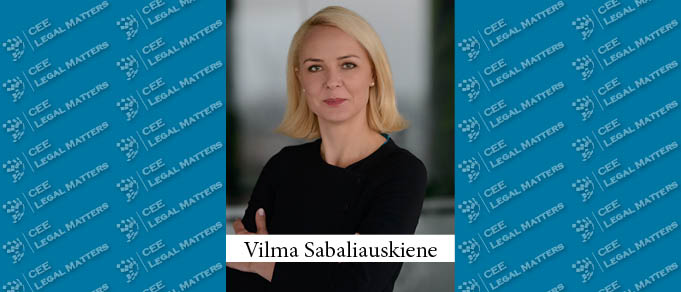The Lithuanian legal landscape is being transformed, with notable changes taking place in the energy, tax, corporate, and employment sectors, according to Lextal Partner Vilma Sabaliauskiene.
“Major changes are taking place in the energy law sector,” Sabaliauskiene begins. Lithuania has just passed an energy law legislative package dubbed the “breakthrough package,” and she says that it puts the Baltic country ahead of the curve in the European Union. “The changes make it easier to construct renewable energy power plants, primarily solar and wind-powered.”
For example, Sabaliauskiene shares that solar and wind power plants can now be constructed on agricultural land as well, without any need for implementing sanitary zones. “This package of laws is quite similar to the upcoming EU Renewables Energy Directive, so it’s a good move for Lithuania to have passed it, both from a legislative standpoint and, also, on account of decreasing the dependency on fossil fuels.” Moreover, she reports that pollution taxes and corporate fines for environmental breaches have been increased, further seeking to prevent damaging the environment.
In addition to the energy sector, Sabaliauskiene reports that the tax system is due for comprehensive reform this autumn. “The reforms, which are to be implemented over the course of the next two years, seek to do a number of things. Firstly, the scope of the real estate tax is to be extended to all real estate properties and is to be applied to all natural persons,” she says. So far, the real estate tax had a value threshold beneath which the properties were not taxed, but the reforms will amend this.
“Secondly, the dividends tax will be applied only in the case of dividends being distributed and paid, akin to the system in Latvia, Estonia, and Poland.” Finally, Sabaliauskiene says that the reforms will also “extend fewer benefits to the income tax paid by the citizens.”
The corporate sector did not go unnoticed, with Sabaliauskiene reporting that a new company law is in the pipeline for Lithuania. “The new law will regulate remote shareholder meetings, create a procedure for minority shareholder buyout, as well as lower the minimum statutory capital requirements for the incorporation of limited liability companies – from EUR 2,500 to EUR 1,000,” she explains. Additionally, starting in August, Lithuania will establish a registry of ultimate beneficial owners, with “companies having to declare accurate information and submit it to the relevant registries,” she adds.
The labor code was also changed, with the legislative framework “finally including the definition of mobbing,” Sabaliauskiene shares. “Also, the changes will further take care of the employees, extending the protections to non-work hours as well, especially in those instances where the employers can extend their influence beyond business hours,” she explains.
Reflecting on the high number of legislative updates, Sabaliauskiene adds: “in Lithuania, we always enjoy creating and changing laws – it's the subsequent implementation that is a challenge!”
Finally, Sabaliauskiene says that, with inflation levels reaching 20% in July, “debt collection and insolvency cases increased. This is already a trend and, with the way things are right now, and the fact that EU sanctions on Russia are impeding certain contracts from being performed, I only expect it to continue,” she concludes.

















